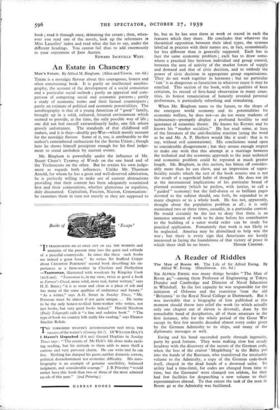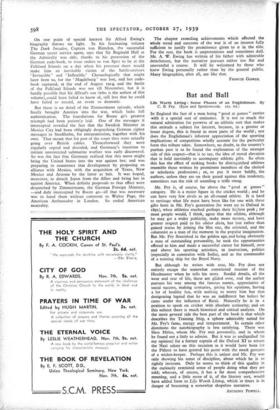A Reader of Riddles
SIR ALFRED EWING was many things besides "The Man of Room 40,"—among them Professor of Engineering at Tokyo, Dundee and Cambridge and Director of Naval Education in Whitehall. In the last capacity he was responsible for the initiation of Osborne and the transition from the old ' Britannia' to the Royal Naval College at Dartmouth. But it was inevitable that a biography of him published at this moment should throw into relief the work (to which actually only one chapter out of eleven is devoted), done by the remarkable band of decipherists, all of them amateurs in the first instance, who for the whole period of the Great War except its first few months decoded almost every order given by the German Admiralty to its ships, and many of the diplomatic messages as well.
Ewing and his band succeeded partly through ingenuity, party by good fortune. They were making slow but steady headway with the discovery of the secrets of the German code, when the loss of the cruiser ' Magdeburg' in the Baltic put into the hands.of the Russians, who transferred the invaluable volume to the Admiralty, a copy of the German code-book itself, clasped in the dead hands of a drowned sailor. Its utility had a time-limit, for codes are changed from time to time, but the Germans' were changed too seldom, for they had few facilities for despatching a new volume to their representatives abroad. To that extent the task of the men in Room 4o at the Admiralty was facilitated. On one point of special interest Sir Alfred Ewing's biography throws no light. In his fascinating volume The Dark Invader, Captain von Rintelen, the successful German secret service agent, says that Sir Reginald Hall at the Admiralty was able, thanks to his possession of the German code-book, to issue orders to von Spec to be at the Falkland Islands on a day when his presence there would make him an inevitable victim of the battle-cruisers ' Invincible' and ' Inflexible.' Chronologically that might have been so, for the ' Magdeburg ' was lost, and her code- book captured, at the end of August 1914, and the battle of the Falkland Islands was not till November, but it is hardly possible that Sir Alfred's son (who is the author of this volume). could have failed to know of, still less that he could have failed to record, an event so dramatic.
But there is no detail of the Zimmermann episode, which finally brought America into the war, which lacks full authentication. The foundations for Room 40's greatest triumph had been patiently laid. One of the messages it intercepted revealed the fact that the Swedish Minister in Mexico City had been obligingly despatching German cipher messages to Stockholm, for retransmission, together with his own. That meant that for part of the route they were actually going over British cables. Thenceforward they were regularly copied and decoded, and Germany's intention to initiate unrestricted submarine warfare was early discovered. So was the fact that Germany realised that this move might bring the United States into the war against her, and was preparing to counteract that development by proposing an alliance with Mexico, with the acquisition of Texas, New Mexico and Arizona by the latter as bait. It was hoped, moreover, to detach Japan from the Allies and bring her in against America. When definite proposals to that effect were despatched by Zimmermann, the German Foreign Minister, —and duly intercepted by Room 40—all that was necessary was to hand them without comment to Walter Page, the American Ambassador in London. So ended American neutrality.
The chapter recording achievements which affected the whole trend and outcome of the war is of an interest fully sufficient to justify the prominence given to it in the title. For the rest, the book is unpretentious and sometimes dull. Mr. A. W. Ewing has written of his father with admirable detachment, but the narrative pursues rather too flat and uneventful a course. It will be welcomed by those who knew Ewing personally rather than by the general public. Many biographies, after all, are like that.
FRANCIS GOWER.









































 Previous page
Previous page